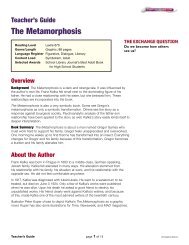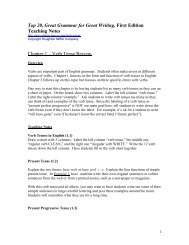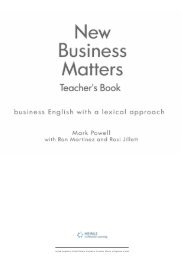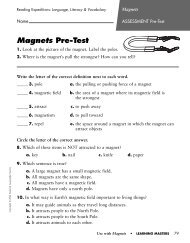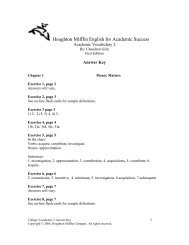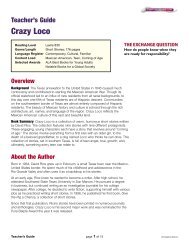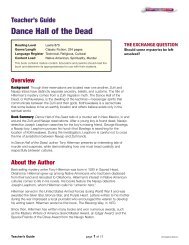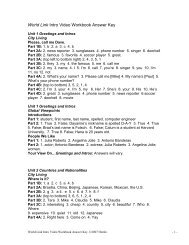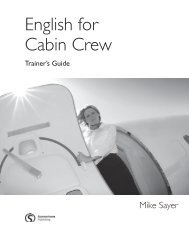Weaving It Together
Weaving It Together
Weaving It Together
Create successful ePaper yourself
Turn your PDF publications into a flip-book with our unique Google optimized e-Paper software.
Play the audio or read the passage aloud<br />
to help students fi nd the answers to these<br />
questions.<br />
Additional Discussion<br />
Questions<br />
26 Unit 2<br />
Why do you think humans are so<br />
interested in training animals?<br />
Do you think animals understand what<br />
they are doing when they perform<br />
tricks?<br />
Do you think it is cruel to train animals<br />
for human entertainment?<br />
Journal<br />
For a week, note in your journal all of the<br />
animals you encounter in the street or on<br />
television or at the movies. Describe each<br />
animal, tell where you saw it, and report<br />
what it was doing.<br />
Culture Cue<br />
Some people believe that it is cruel for<br />
humans to train animals. Some cultures<br />
have taboos about touching certain types<br />
of animals or keeping them as pets.<br />
Internet Activity<br />
You might suggest that students compare<br />
customs relating to a specifi c event in<br />
various societies. For example, how are<br />
marriage customs different in different<br />
countries? Suggested keywords: the name<br />
of the custom (for example, marriage<br />
customs) followed by the name of a country<br />
(for example, India)<br />
Predicting, p. 41<br />
Answers will vary.<br />
Vocabulary<br />
A. Vocabulary in Context, p. 43<br />
1. a 2. d 3. a 4. b 5. a 6. a 7. b<br />
8. b 9. d 10. d<br />
B. Vocabulary Building, p. 45<br />
1. a. competitors b. competitive<br />
2. a. entry b. entrants 3. a. predict<br />
b. predictable<br />
C. Vocabulary in New Context, p. 45<br />
Answers will vary.<br />
Reading Comprehension<br />
A. Looking for the Main Ideas, p. 45<br />
1. c 2. a 3. d<br />
B. Looking for Details, p. 46<br />
1. The idea for the Jumping Frog<br />
Contest came from a short story by<br />
Mark Twain. 2. The contest takes place<br />
each year. 3. Approximately 50,000<br />
people attend the contest. 4. The entry<br />
fee includes the cost of renting a frog.<br />
5. People can rent a frog. 6. The<br />
“jockey” tries to make the frog jump.<br />
7. The frog must make three jumps.<br />
8. The frogs lift weights, eat centipede<br />
soup, and do high dives.<br />
C. Making Inferences and Drawing<br />
Conclusions, p. 47<br />
Answers will vary. Possible answers:<br />
1. People enjoy simple, uncomplicated<br />
ways of having fun. 2. The sponsors<br />
make their money from the food, rides,<br />
00238-X_006-073.indd 26 11/12/09 8:39 PM



